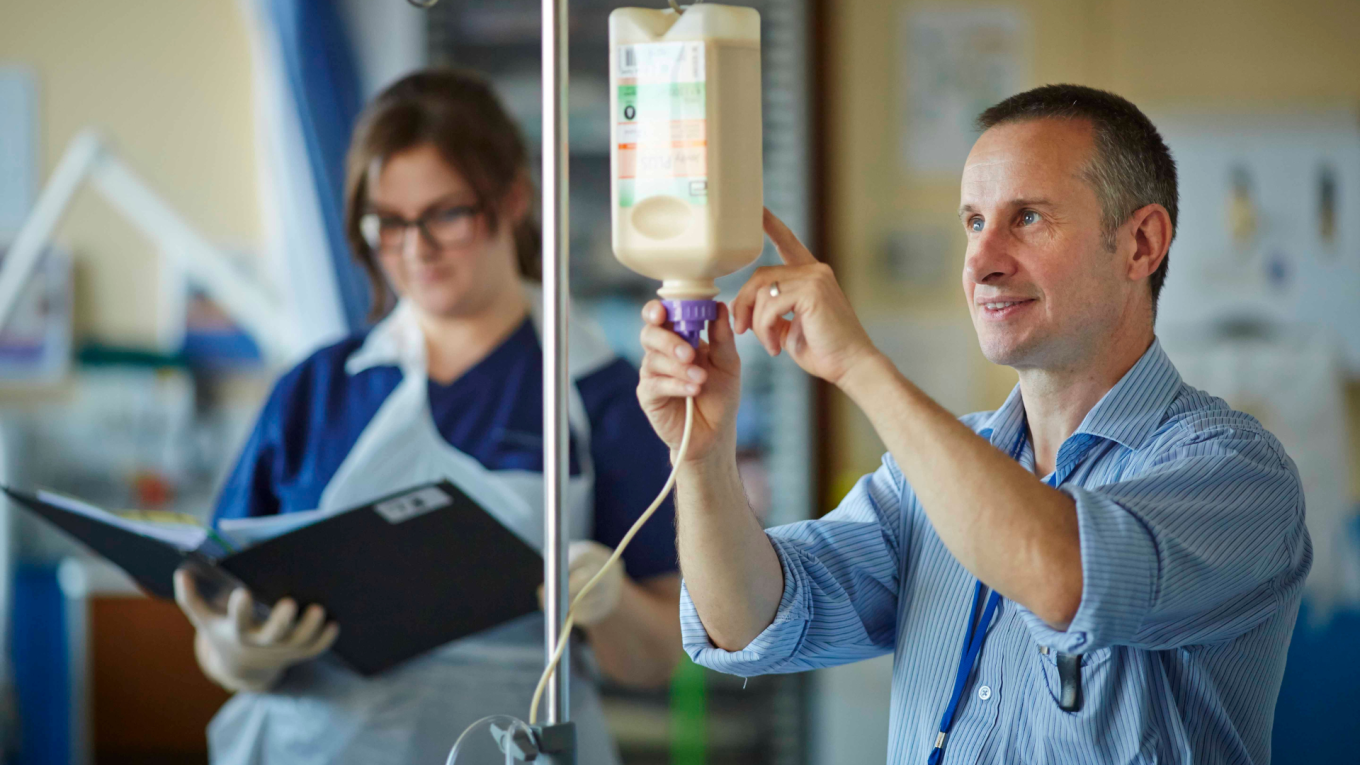
Dietitian
Dietitians use their expertise in nutrition to give people clear, practical advice about food. They help individuals make informed choices that support their health and wellbeing.

On this page
Introduction to the role
Dietitians assess, diagnose and treat a wide range of dietary and nutritional issues. The role focuses on promoting good health and preventing disease, both for individuals and within communities.
As a dietitian, you’ll take scientific and medical research about food and health and turn it into clear, practical advice that people can use in their daily lives. You may also provide training for other healthcare professionals on diet and nutrition.
About the role
What does a dietitian do?
As a dietitian, you’ll work in hospitals, in the community, or directly with individuals. Your patients could be living with a health condition, recovering from illness, or simply looking to improve their wellbeing. You might help someone manage digestive problems, support healthy weight gain or loss, advise on food allergies, assist athletes aiming to improve their performance, or work with people who have eating disorders or conditions such as HIV.
You’ll often collaborate with other healthcare professionals and nutritionists and may supervise dietetic assistants. It’s important to note that dietitians and nutritionists have different roles, qualifications and regulatory bodies.
What are the pay and conditions like?
If you work as a dietitian in the NHS, you’ll usually have a 37.5 hour working week, which may include some evenings or weekends.
Most dietitians start at band 5 on the Agenda for Change pay scale. You’ll also receive at least 27 days of annual leave plus bank holidays, along with access to the NHS pension scheme and a range of staff discounts.
Where dietetics can take you
Once you have qualified as a dietitian, a range of career paths may become available.
You could:
- specialise in a clinical field such as cancer care or diabetes
- focus on supporting specific groups, including older people or those with learning disabilities
- move into teaching or health education
- take on a management role, leading a team and managing budgets
- work in sports nutrition or within the food industry
- explore opportunities in marketing, publishing, sales or public relations
You’ll have regular professional development reviews to support your goals and keep your skills up to date. You may also choose to join the British Dietetic Association to access further training, events and networking opportunities.
Working as a dietitian
Working as a dietitian
Person specification
Is dietetics right for you?
Working as a dietitian means combining a passion for science with a genuine interest in food and how it affects people’s health and lifestyles. You’ll need to communicate clearly with people from all walks of life, explaining complex information in a way that’s easy to understand and act on.
Ask yourself:
- Can I translate scientific knowledge into practical advice?
- Am I confident speaking with individuals and groups about sensitive health topics?
Do your skills suit the role?
As a dietitian, you’ll work with people facing a range of health challenges, so empathy, patience and strong interpersonal skills are essential. You’ll also need to be organised, observant and able to adapt your approach to meet each person’s needs.
Ask yourself:
- Do I listen carefully and respond to individual concerns?
- Can I balance scientific accuracy with a supportive, approachable manner?
Find a course with UCAS
Want to explore the next step in traditional degree routes into the NHS? Explore courses related to dietetics with UCAS today.
Entry requirements and training
To become a dietitian, you will need to successfully complete an approved undergraduate or master's degree in degree in dietetics. Once you have completed your studies, you must register with the Health and Care Professions Council (HCPC) before you can begin practising.
Most universities undergraduate course ask for two or three A levels, such as chemistry, maths or biology, along with five GCSEs at grades 4–9 (A–C), including English language and maths. Equivalent qualifications may also be accepted, such as a BTEC, HND or HNC with science subjects, a relevant T level or NVQ, a science-based access course, or equivalent level Scottish or Irish qualifications.
If you’re applying for a postgraduate course, you’ll usually need an honours degree containing an acceptable level of human physiology and biochemistry.
A degree apprenticeship in dietetics is another route into the profession. This allows you to work while studying, with tuition fees paid by your employer and the government.
Find out more about routes into the NHS with UCAS.
Work experience
Applying for a course or apprenticeship as a dietitian is going to be competitive. If you're seriously considering it, it is a great idea to try and gain some prior work experience to strengthen your application. Visit NHS England to find out more about gaining work experience for careers in the NHS.
Financial support at university
You could receive at least £5,000 a year to help fund your studies while at university in England. Your personal circumstances and the course you choose may mean you could receive more. And the good news? You'll never have to pay it back.
Explore NHS Careers
There are over 350 different NHS careers and everyone makes a difference every day. Whether you’re still in education or thinking about changing careers, you'll get the information you need.